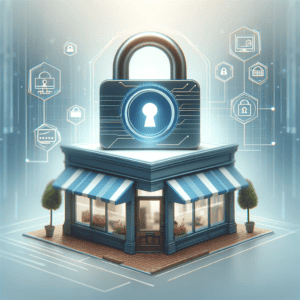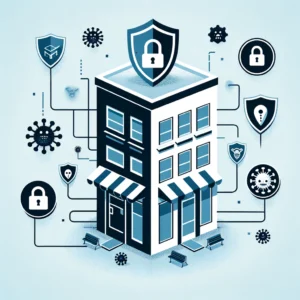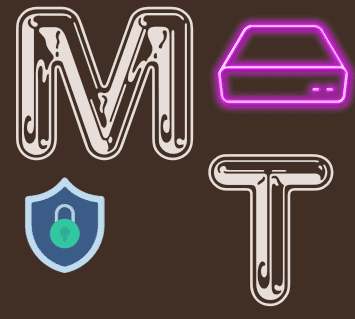Discover the 3 Keys to Understanding Cybersecurity for Small Businesses Before It’s Too Late!
Understanding the Importance of Cybersecurity for Small Businesses

Small businesses often underestimate the importance of cybersecurity in today’s digital landscape. However, the reality is that no business, regardless of its size, is immune to cyber threats. Cybercriminals actively target small businesses due to their perceived vulnerability. Small businesses also have limited resources. They often lax cybersecurity practices. Therefore, prioritizing cybersecurity is crucial if a small business is to survive.
Why is implementing Best Practices Important?
Implementing cybersecurity best practices is vital in safeguarding sensitive information and maintaining the trust of customers.
Best Practices
Small businesses must adopt measures such as robust password policies, regular software updates, and employee training on cybersecurity.
A strong password is the first line of defense against cyber threats. By using unique, complex passwords that are changed regularly, small businesses can significantly reduce the risk of unauthorized access to their systems.
New attack vectors happen all the time, and software companies implement patches or come up with work arounds. Regular software updates reduce the risk of attack from these new vectors.
Additionally, educating employees on cybersecurity tips, such as identifying phishing attempts and avoiding suspicious links, plays a critical role in protecting the business from potential breaches. By implementing these security measures and building a strong cybersecurity posture, small businesses can enhance their resilience against cyber threats.
What are the Common Cybersecurity Threats Facing Small Businesses

Small businesses are increasingly becoming prime targets for cyber attacks, highlighting the critical need for effective cybersecurity measures. Without proper protection, these businesses can face significant risks and potential damage to their operations.
One of the most common cybersecurity threats facing small businesses is phishing attacks. Phishing attempts involve cybercriminals tricking employees into sharing sensitive information, such as login credentials or financial data, through deceptive emails or websites. To combat this threat, businesses need to implement robust security software and educate their employees on cybersecurity best practices.
Another prevalent cybersecurity threat that small businesses need to address is malware. Malware encompasses various malicious software, such as viruses, worms, or ransomware. Malware can infiltrate a business’s systems and cause havoc. This can be addressed through tools such as system monitoring, firewalls and antivirus software.
By following best practices to protect against these common cyber threats, small businesses can proactively safeguard their operations and valuable data.
How to Implement Best Practices for Cybersecurity for Small Businesses?
Implementing cybersecurity best practices is crucial for small businesses to protect their sensitive data and prevent cyberattacks. One of the first steps small business owners should take is to ensure that passwords used for all accounts are strong and unique. Strong passwords should be a combination of letters, numbers, and special characters and should avoid using personal information, such as names or birthdates.
By using strong passwords, small business owners can significantly reduce the risk of unauthorized access to their accounts and sensitive information.
In addition to strong passwords, small business owners should also implement multi-factor authentication (MFA) whenever possible. MFA adds an extra layer of security by requiring users to provide additional authentication factors, such as a fingerprint or a unique code sent to their mobile device. This significantly reduces the risk of unauthorized access, even if a password is compromised.
Small business owners must prioritize educating themselves and their employees about the dangers of phishing attacks, which are one of the most common cyber threats facing small businesses. Phishing attacks involve tricking individuals into revealing sensitive information or clicking on malicious links through deceptive emails or messages.
By being aware of phishing techniques and regularly training employees to recognize and report suspicious emails, small business owners can protect their businesses from falling victim to these types of attacks.
Overall, implementing cybersecurity best practices is essential for small businesses to identify and address vulnerabilities, defend against cyber threats such as ransomware and data breaches, and ultimately safeguard their operations and reputation.
How to Protect Your Small Business from Phishing Attacks?
Phishing attacks continue to be one of the most common cybersecurity threats faced by small businesses. These attacks often involve cybercriminals impersonating trusted entities in an attempt to gain access to sensitive information or deceive employees into downloading malicious software.
To protect your business, implementing cybersecurity best practices is crucial. One important step is to invest in antivirus software that can detect and prevent phishing attempts.
In addition to antivirus software, there are several other measures you can take to enhance the security posture of your small business.
Educating employees about cybersecurity threats and providing regular training on best practices for small businesses can help them identify and avoid phishing attempts. It is also essential to reinforce the importance of not clicking on suspicious links or providing sensitive information through unfamiliar channels.
By implementing these cybersecurity tips and additional security measures, you can significantly reduce the risk of falling victim to a phishing attack or other cybersecurity threats that could potentially lead to a ransomware attack or compromise your business’s sensitive data.
What is the Role of Strong Passwords in Cybersecurity for Small Businesses?
The role of strong passwords is crucial in maintaining cybersecurity for small businesses. Passwords serve as the first line of defense against cyber threats and unauthorized access to sensitive information. They play a vital role in safeguarding the digital assets of a business, such as customer data, financial records, and proprietary information.
To provide guidance for small businesses, it is essential to implement security measures that prioritize the use of strong and unique passwords. Best cybersecurity practices recommend using a combination of uppercase and lowercase letters, numbers, and special characters. This complexity makes it harder for hackers to crack passwords and gain unauthorized access to systems.
Additionally, regularly updating passwords and avoiding the reuse of old passwords can help small businesses mitigate security vulnerabilities.
The Small Business Administration (SBA) offers guidance on how to improve your cybersecurity by creating strong passwords. They recommend using password managers, which are software programs that generate and store complex, unique passwords.
These tools simplify the process of remembering multiple passwords while ensuring their security.
Many password managers also offer additional security features, such as two-factor authentication, which adds an extra layer of protection to accounts. Implementing these cybersecurity measures can help small businesses protect their digital assets and mitigate the risks associated with cyber threats.
How do you Build a Culture of Cybersecurity within Your Small Business?
Building a culture of cybersecurity within your small business is crucial in today’s digital landscape. While larger businesses often have dedicated IT teams and resources to ensure their company’s security posture, small businesses also have additional security obligations.
Implementing cybersecurity practices and incorporating them into your daily operations can help protect your business data and prevent data breaches. To start, familiarize yourself with the latest security threats and best practices by utilizing validated tools and anti-fraud services.
The Small Business Administration offers a list of free cybersecurity resources, such as the Small Biz Cyber Planner 2.0, which can assist you in developing a comprehensive cybersecurity toolkit.
Encouraging your employees to prioritize cybersecurity is essential. Provide regular training on cybersecurity tips and best practices to ensure that everyone understands their role in maintaining a culture of security. Be sure to remind employees about the importance of strong passwords. Encourage them to use unique and complex passwords for all their accounts.
By incorporating cybersecurity into your everyday routine and fostering a culture of security, you can better protect your small business from potential cyber threats.
Have a Plan for Regular System Updates

Implementing a cybersecurity program that regularly updates software, performs regular backups, and conducts routine risk and security assessments is essential for protecting small businesses against malware attacks. This program should also include cybersecurity training for employees. Remember that training plays a vital role in maintaining a secure digital environment.
Most software packages and operating systems have automated detection of updates. One should not just do updates randomly; it is best to review them, if possible test them on a small sample of systems, then schedule the updates to minimize disruption to the business.
What are Essential Measures in Cybersecurity for Small Businesses
Small businesses, regardless of their size or sector, need a cybersecurity strategy in place to protect their valuable assets from cyber threats. The need for robust cybersecurity measures cannot be overstated in today’s digital landscape.
Organizations across the cybersecurity community have recognized this fact and have been working tirelessly to help small businesses understand and implement the necessary practices and policies.
One of the essential security measures every business should take to protect their small is cybersecurity training. Even the smallest business can benefit from attending seminars on the best cybersecurity practices and staying up to date with the latest industry trends. These training sessions can provide valuable insights into potential vulnerabilities and offer guidance on how to mitigate risks.
Additionally, educating employees on cybersecurity awareness can help small businesses create a culture of cybersecurity within their organization. This includes teaching employees about the use of strong passwords, the importance of regular software updates, and the proper use of business computers to minimize the risk of cyber-attacks.
How to Train Employees on Cybersecurity? Tips and Best Practices
Training employees on cybersecurity is key to protecting small businesses from the range of cyber threats that can potentially harm their operations. One of the best ways to instill good cybersecurity practices in employees is by providing them with ongoing training and resources. This training can include educating employees about the risks associated with using business computers for personal purposes, as well as the importance of not sharing sensitive information or clicking on suspicious links.

By offering free cybersecurity resources, such as online courses or informative articles, businesses can empower their employees to become more informed and aware of the potential threats they may encounter.
In addition to providing training, it is crucial for businesses to enforce security policies and educate employees on their security obligations related to agreements and contracts. Employees should understand the importance of adhering to these policies and be aware of the consequences that may arise from noncompliance. Furthermore, regularly updating employees on the latest cybersecurity threats and best practices through newsletters or internal communications can help keep cybersecurity at the forefront of their minds.
By implementing these measures, businesses can cultivate a culture of cybersecurity awareness, ensuring that every employee understands their role in protecting the company’s data and systems.
How to Create a Cybersecurity Program for Your Small Business?
When it comes to creating a cybersecurity program for your small business, it is essential to prioritize the implementation of best cybersecurity practices. These practices should include keeping your small business protected from cyberattacks by installing security apps and utilizing anti-fraud services.
Additionally, it is necessary to stay informed about any additional security obligations related to your industry or specific business operations. This can be done by staying updated on the latest recommendations and services provided by the Cybersecurity and Infrastructure Security Agency (CISA), as well as the services offered by private cybersecurity firms. By following these effective security measures, you can keep your business running smoothly and safeguard it from potential threats.
Creating a strong cybersecurity program requires a comprehensive approach that covers all aspects of your business operations. It is important to assess and address potential vulnerabilities in your systems and networks regularly. Regular vulnerability assessments help identify areas that need improvement and allow you to take necessary steps to mitigate risks. Moreover, training your employees on cybersecurity best practices is crucial to minimize the human element of security breaches.
By instilling a culture of cybersecurity within your small business, you can ensure that everyone understands their role in protecting sensitive data and adheres to established protocols. Additionally, regularly updating your security software and systems will help in keeping up with emerging threats and prevent potential breaches. With a well-rounded cybersecurity program in place, you can keep your business secure and focus on its growth and success.
What are The Benefits of Security Software for Small Business Cybersecurity?
In today’s digital landscape, protecting small businesses from cyber threats is paramount. One effective way to fortify your defenses is by utilizing security software specifically designed for small business cybersecurity. Such software offers a range of benefits that can help safeguard your sensitive data and ensure the smooth operation of your business.
First and foremost, security software provides a comprehensive solution for identifying and mitigating cyber threats. It helps proactively detect and block malicious activities, such as malware and ransomware, before they can infiltrate your network. By continuously monitoring your systems and network traffic, security software serves as an invaluable layer of defense, keeping your business safe from potential breaches. Additionally, many security software solutions offer features that allow you to assess your security posture and identify vulnerabilities.
These tools can help you stay one step ahead of cybercriminals by providing insights into areas of potential risk and security gaps that need attention.
Implement cybersecurity for your small business before it’s too late!
Frequently Asked Questions
Why is cybersecurity important for small businesses?
Cybersecurity is important for small businesses because they are often targeted by cybercriminals due to their limited resources and weaker security measures. A successful cyber-attack can result in financial loss, damage to reputation, and even the closure of the business.
What are some common cybersecurity threats facing small businesses?
Common cybersecurity threats facing small businesses include phishing attacks, ransomware, malware, data breaches, and insider threats. These threats can lead to stolen sensitive information, financial loss, and disruption of business operations.
How can small businesses implement cybersecurity best practices?
Small businesses can implement cybersecurity best practices by regularly updating software and systems, using strong and unique passwords, securing Wi-Fi networks, educating employees about cybersecurity, and regularly backing up important data.
How can small businesses protect themselves from phishing attacks?
Small businesses can protect themselves from phishing attacks by educating employees about how to identify and report phishing emails, implementing email filtering systems, using multi-factor authentication, and regularly updating anti-phishing software.
What role do strong passwords play in small business cybersecurity?
Strong passwords play a crucial role in small business cybersecurity as they make it harder for cybercriminals to guess or crack passwords. It is recommended to use long passwords with a combination of uppercase and lowercase letters, numbers, and special characters.
How can small businesses build a culture of cybersecurity?
Small businesses can build a culture of cybersecurity by promoting awareness and understanding of cybersecurity among employees, providing regular training and updates on cybersecurity best practices, and encouraging a proactive approach to reporting and responding to security incidents.

